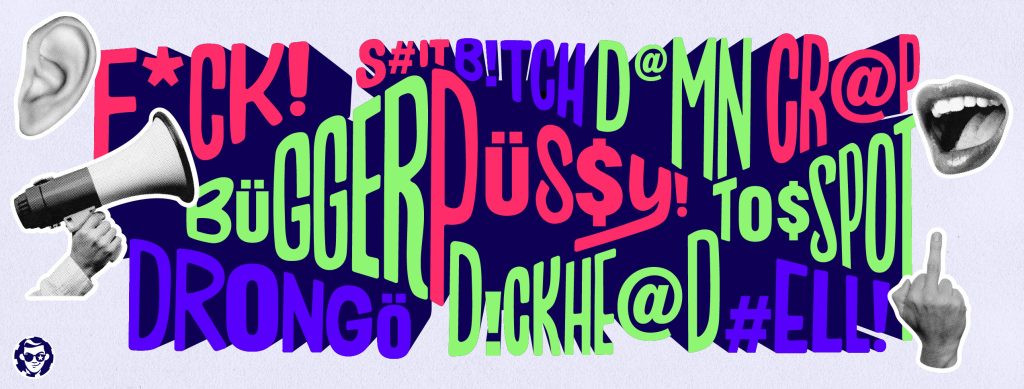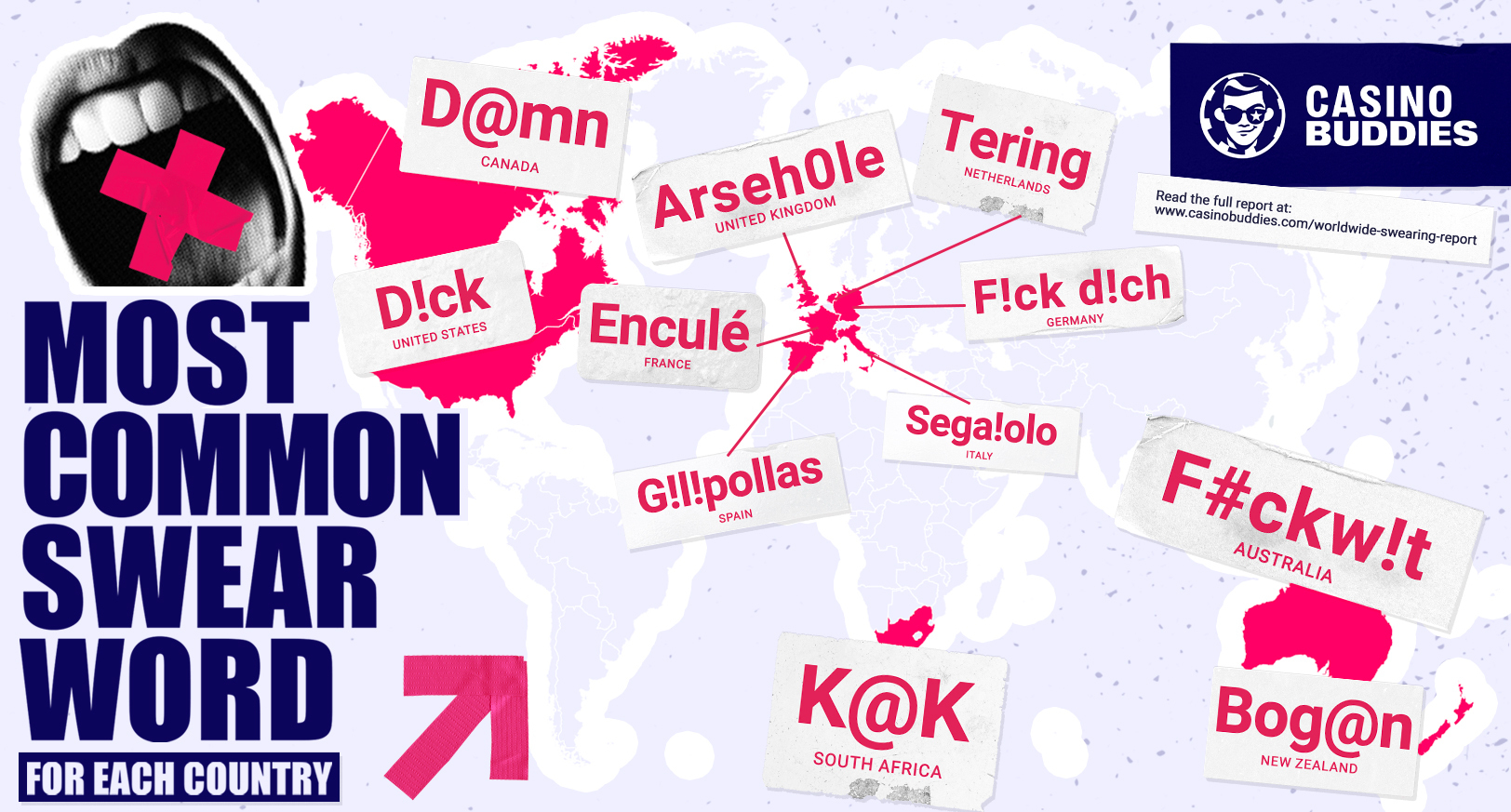Top Swear Words Around The World
Winning big and shouting your favourite curse word often brings a rush of excitement, arousal, and catharsis. After reviewing countless online casinos, we at CasinoBuddies.com know that sometimes you just have to let it all out, and only certain words truly capture that feeling.
But just as thrilling as the win is the sting of a loss, where a well-timed swear can feel just as satisfying. Whether you’re riding high or hitting rock bottom, these words help express the raw emotion of it all.
But why do people swear? What is it about these words that makes them so powerful in moments of extreme emotion? To find out which curse words carry the most weight around the world, CasinoBuddies.com analysed data from 11 countries.
From YouTube comments to search trends and the lyrics of popular artists, the study explored the language people use when emotions run high to reveal which curse words mean the most in each place—from the classic F-bomb to creative local slang.

The World's Favourite Four-letter Words
With 9 out of 11 countries’ favourite swear words being hyper-regional, it’s clear that certain terms carry deep cultural meaning. Australia’s “drongo”—originally the name of a slow racehorse in the 1920s—evolved into a term for someone foolish, while Spain’s “gilipollas” is everywhere, even though no one knows exactly where it came from or how it became popular. These words show how swearing often captures emotions and situations that ordinary language simply can’t.
From milder words like “damn” in Canada to stronger expressions such as “fick dich” in Germany and “enculé” in France, swear words serve a variety of purposes. In the world of online gaming and betting, they become part of the emotional rollercoaster: you curse when you’re on a losing streak, vent over a bad beat, or even celebrate a massive win.
They can describe a glitchy game, a frustrating opponent, or a terrible hand that cost you everything. Across cultures, the intensity and usage of these words may vary—but the sentiment is the same: when money’s on the line, emotions run high, and so does the language.

Crikey! Australia's Favourite Curse Words
| Australia's Top 10 Swear Words | ||
|---|---|---|
Rank |
Swear Word |
Commonality Score |
1 |
Drongo |
0.313 |
2 |
Bogan |
0.259 |
3 |
Get Stuffed |
0.114 |
4 |
Bugger |
0.114 |
5 |
Crap |
0.086 |
6 |
Hell |
0.067 |
7 |
Dickhead |
0.064 |
8 |
Pussy |
0.053 |
9 |
Dick |
0.050 |
10 |
Tosspot |
0.047 |
“Drongo” and “bogan” coming out on top might not be surprising, as both words are uniquely Australian and deeply embedded in the country’s cultural slang. Their popularity is largely due to their relatively mild nature compared with more vulgar terms further down the list. While they can still be used to insult or mock, Aussies often deliver them with a tone of humour or light-hearted judgement rather than outright offence.
For non-Australian readers, “drongo” typically refers to someone who’s a bit clueless or foolish, while “bogan” is used to describe someone seen as uncultured or rough around the edges. In the world of gaming and online betting, these terms often surface in the heat of play—used to mock an unlucky opponent, laugh off your own misstep, or trash-talk a frustrating teammate.
Because they don’t carry the same level of profanity or aggression as words like “dickhead” or “pussy”, they’re more socially acceptable in casual conversation, media, and even light workplace banter. This accessibility makes them go-to terms for expressing irritation or disappointment without veering into full-on vulgarity—whether you’re losing a big bet or calling out someone for a rookie mistake.
Cursing Across Continents: The Top 50 Swears
Swear words are everywhere—from casual conversations to social media rants—and some get used far more than others. We analysed data across 11 countries to uncover which curse words are most commonly spoken, typed, and searched. The result? A ranking of the 50 most frequently used swear words around the world, from everyday exclamations to the truly explicit.
Across all languages and cultures, swear words remain a primary way for people to express frustration, insult, disbelief, or humour. Whether shouted in traffic or muttered under your breath, the words people turn to in emotional moments often say more than we realise. Many of the most commonly used swear words around the world reflect not just strong feelings, but also cultural nuances, regional slang, and shared experiences.
In Australia, for example, calling someone a “drongo” or “bogan” can be playful or teasing rather than insulting. In Ireland, words like “savvy fecker” can be used to compliment someone’s cleverness, while in parts of Italy, “che testa di cavolo” (“what a cabbage head”) might be said in a jokingly affectionate way among friends. These examples show that swearing isn’t always about anger—it can also convey humour, admiration, or camaraderie depending on the culture.
Globally, words like “pussy,” “dick,” and “arse” rank highest in search volume—suggesting that body-related terms still dominate the way we curse. These words are blunt, visceral, and often versatile, which makes them go-tos across languages and online platforms. But as the data shows, swearing isn’t one-size-fits-all.
Milder curse words such as “damn,” “hell,” or “crap” also hold steady in search trends, showing there’s still a space for lighter expressions of annoyance and disbelief. From casual insults to full-blown expletives, swearing remains one of the most emotionally charged forms of communication we have. Whether universal or uniquely regional, the way we swear says a lot about who we are.
Top Swear Words Used in Popular Songs Across the Globe
Certain swear words appear repeatedly in popular music across the globe. The word “arse” occurs 66 times in some of the world’s most popular songs—such as Justin Bieber’s Confident, Travis Scott’s Fein, and Kendrick Lamar’s Not Like Us—commonly used to describe anatomy or refer to a person. Following closely is the word “hell,” with 63 mentions by popular artists in their hit tracks.
When it comes to swearing, Kendrick Lamar takes the throne with 69 expletives across his most popular songs. He often uses profanity to add meaning and depth to his storytelling, emphasising emotion, frustration, or social commentary. Another rap star, Tommy Richman, comes in second for the most swear words used in his tracks. This reflects a broader trend in rap, where swearing is used not just for shock value but as a tool to convey authenticity, intensity, and raw emotion—helping artists connect with listeners on a visceral level.
Rounding out the top three is pop princess Sabrina Carpenter, who uses 20 swear words among her most popular songs. This shows how explicit language spans genres, with both rap and pop artists incorporating profanity to enhance expression, emotional impact, or even the catchiness of a track.
For those looking to swap swearing for the thrill of winning big, we at CasinoBuddies.com review online casinos to give you the confidence to know where to place your bets for the best chance at a win.
Methodology
We identified the most commonly used swear words in different countries around the world by analysing comments on each country’s most popular YouTube videos and using Ahrefs to determine the total average search volumes for each term. Data accurate as of 30 July 2025.


